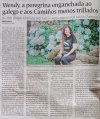- Time of past OR future Camino
- Some in the past; more in the future!
Our own @Wendy Werneth is in La Voz de Galicia today as she walks the Camiño Taverneiro this week:

It’s behind a paywall unfortunately, but here is the headline and photo:


Wendy, a peregrina enganchada ao galego e aos Camiños menos trillados
No 2021 chegou á Estrada pola Geira e agora regresa pola ruta de Taverneiro
www.lavozdegalicia.es
It’s behind a paywall unfortunately, but here is the headline and photo:



















